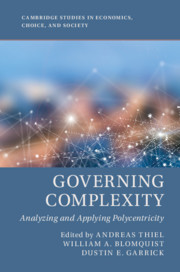Book contents
- Governing Complexity
- Cambridge Studies in Economics, Choice, and Society
- Governing Complexity
- Copyright page
- Contents
- Figures
- Tables
- Boxes
- Contributors
- Acknowledgements
- Introduction
- Part I Foundations for Understanding and Researching Polycentric Governance
- Part II Interactions and Performance in Polycentric Governance
- Part III Constituting Polycentric Governance
- 9 Polycentricity and Citizenship in Environmental Governance
- 10 The Faustian Bargain
- 11 Practising Polycentric Governance
- Conclusions
- References
- Index
10 - The Faustian Bargain
Power-Sharing, Constitutions, and the Practice of Polycentricity in Governance
from Part III - Constituting Polycentric Governance
Published online by Cambridge University Press: 13 September 2019
- Governing Complexity
- Cambridge Studies in Economics, Choice, and Society
- Governing Complexity
- Copyright page
- Contents
- Figures
- Tables
- Boxes
- Contributors
- Acknowledgements
- Introduction
- Part I Foundations for Understanding and Researching Polycentric Governance
- Part II Interactions and Performance in Polycentric Governance
- Part III Constituting Polycentric Governance
- 9 Polycentricity and Citizenship in Environmental Governance
- 10 The Faustian Bargain
- 11 Practising Polycentric Governance
- Conclusions
- References
- Index
Summary
Constitution-making involves a 'Faustian bargain' in which individuals and smaller communities give up some of their autonomy for the sake of the benefits brought by larger-scale societies. Transitioning from small-scale quasi-egalitarian societies towards a complex, but more hierarchical, political system makes possible collective action and the provision of public goods at much larger scales, including defence, establishing larger common markets, and basic infrastructure. After introducing the concept of the 'Faustian' bargain, the chapter explains how constitutive rules create such bargains. We turn to the role of monitoring, conflict resolution, and sanctioning as means of building commitments to constitutions, providing for stability and flexibility. The chapter illustrates these relationships using two cases of constitution-making: the multi-level governance of New York City watersheds, and post-conflict situations in which leaders of different ethnic groups come to agreement.
Keywords
- Type
- Chapter
- Information
- Governing ComplexityAnalyzing and Applying Polycentricity, pp. 219 - 236Publisher: Cambridge University PressPrint publication year: 2019

